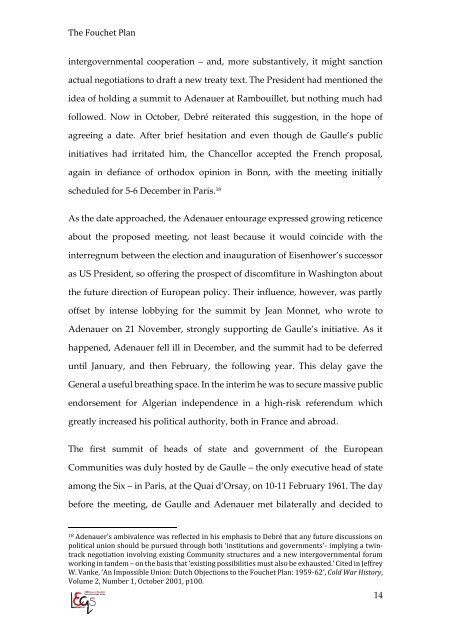The Fouchet Plan De Gaulle’s Intergovernmental Design for Europe
n?u=RePEc:eiq:eileqs:117&r=cdm
n?u=RePEc:eiq:eileqs:117&r=cdm
You also want an ePaper? Increase the reach of your titles
YUMPU automatically turns print PDFs into web optimized ePapers that Google loves.
<strong>The</strong> <strong>Fouchet</strong> <strong>Plan</strong><br />
intergovernmental cooperation – and, more substantively, it might sanction<br />
actual negotiations to draft a new treaty text. <strong>The</strong> President had mentioned the<br />
idea of holding a summit to Adenauer at Rambouillet, but nothing much had<br />
followed. Now in October, <strong>De</strong>bré reiterated this suggestion, in the hope of<br />
agreeing a date. After brief hesitation and even though de <strong>Gaulle’s</strong> public<br />
initiatives had irritated him, the Chancellor accepted the French proposal,<br />
again in defiance of orthodox opinion in Bonn, with the meeting initially<br />
scheduled <strong>for</strong> 5-6 <strong>De</strong>cember in Paris. 18<br />
As the date approached, the Adenauer entourage expressed growing reticence<br />
about the proposed meeting, not least because it would coincide with the<br />
interregnum between the election and inauguration of Eisenhower’s successor<br />
as US President, so offering the prospect of discomfiture in Washington about<br />
the future direction of <strong>Europe</strong>an policy. <strong>The</strong>ir influence, however, was partly<br />
offset by intense lobbying <strong>for</strong> the summit by Jean Monnet, who wrote to<br />
Adenauer on 21 November, strongly supporting de <strong>Gaulle’s</strong> initiative. As it<br />
happened, Adenauer fell ill in <strong>De</strong>cember, and the summit had to be deferred<br />
until January, and then February, the following year. This delay gave the<br />
General a useful breathing space. In the interim he was to secure massive public<br />
endorsement <strong>for</strong> Algerian independence in a high-risk referendum which<br />
greatly increased his political authority, both in France and abroad.<br />
<strong>The</strong> first summit of heads of state and government of the <strong>Europe</strong>an<br />
Communities was duly hosted by de Gaulle – the only executive head of state<br />
among the Six – in Paris, at the Quai d’Orsay, on 10-11 February 1961. <strong>The</strong> day<br />
be<strong>for</strong>e the meeting, de Gaulle and Adenauer met bilaterally and decided to<br />
18 Adenauer’s ambivalence was reflected in his emphasis to <strong>De</strong>bré that any future discussions on<br />
political union should be pursued through both ‘institutions and governments’- implying a twintrack<br />
negotiation involving existing Community structures and a new intergovernmental <strong>for</strong>um<br />
working in tandem – on the basis that ‘existing possibilities must also be exhausted.’ Cited in Jeffrey<br />
W. Vanke, ‘An Impossible Union: Dutch Objections to the <strong>Fouchet</strong> <strong>Plan</strong>: 1959-62’, Cold War History,<br />
Volume 2, Number 1, October 2001, p100.<br />
14


